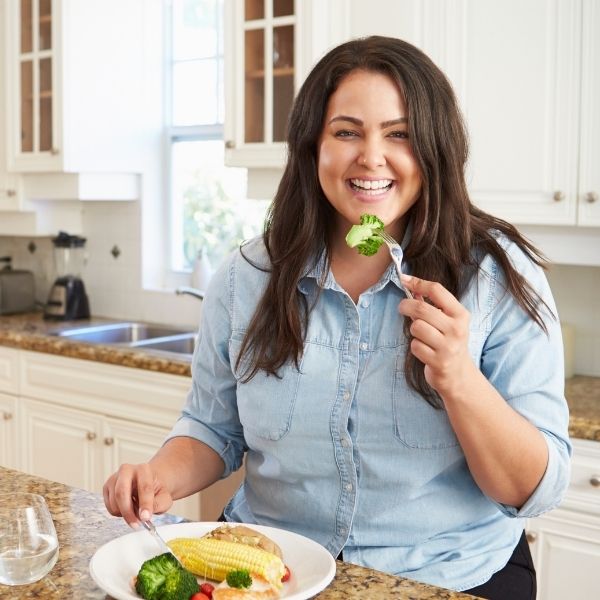Snacking has developed a bad reputation over the years. When most people hear the term “snack food,” ultra-processed foods like cookies, chips, and candy typically come to mind. However, a snack is simply defined as any food or drink you consume between meals.
According to the British Journal of Nutrition, there is no conclusive research to support that the frequency at which you eat has any effect on the number of calories you burn. Similarly, there is little evidence to suggest that snacking between meals increases or decreases your weight. While some studies show a correlation between high-protein, high-fiber snacks and weight loss, others suggest that snacking in between meals can cause weight gain.
With all of these varied results, how do you know if it’s healthy to snack? In honor of National Nutrition Month, we’re answering this question in detail.
Listen to your body
Eat when you’re hungry. Do you need the extra calories from a snack or are you bored, anxious, or depressed? People often reach for snacks to change the way they feel rather than to satisfy their hunger or increase their energy. To prevent your mind and body from associating food with pleasure, try to only eat when you are hungry, and not for fun or relaxation.
Eat to recover. In addition to your age and size, your caloric intake should be based on your activity level. If you have just finished an intense workout, a snack may be completely appropriate to replenish your body and support muscle growth.
Don’t increase your calories. Snacking can prevent you from eating overly-large meals, but you’re at risk of gaining weight if you don’t adjust your meal size. A common reason people gain weight when they snack is that they don’t factor their snack into their overall daily caloric intake.
Eat smaller meals
Aim for three 400-500 calorie meals and three 100-200 calorie snacks a day. This will put you right at the FDA’s 2,000-calorie recommendation for the average person. Eating smaller meals will help keep you from feeling sluggish throughout the day and will help prevent your insulin levels from spiking.
If you don’t feel full after finishing your meal, wait 20 minutes, as this is the amount of time it takes your body to register whether or not it’s satiated. And because it takes your body a little while to respond to being fed, try eating your meals more slowly. This can help keep you from overeating.
It matters when you snack
Research suggests that late-night snacking can increase cholesterol and blood sugar levels and make you more insulin resistant, according to a Physiology & Behavior article. In fact, a study conducted by Vanderbilt University found that participants who ate breakfast, lunch, and dinner versus those who ate lunch, dinner, and a late-night snack burned more body fat overnight.
Given this, you may want to consider decreasing your calorie intake later in the day. Making dinner your smallest meal can give your body adequate time to digest before bed and help keep your blood sugar down overnight, making it easier for your metabolism to do its job.
Eat these healthy snacks instead
There’s a reason why pretzels, peanuts, and apples were some of the first snack foods in the U.S.—they’re easy to consume, don’t require refrigeration, and are healthy in moderation. If you do need to reach for a snack between meals, choose unprocessed, single-ingredient foods (a.k.a. whole foods), such as fruits, veggies, and nuts.
It’s important to moderate your snack consumption, even if the snacks are healthy.
Most shelf-stable snacks, including protein bars and shakes, are likely to be unhealthy because they are processed (meaning they contain added fats, sugars, and preservatives). Processing food increases its shelf life, but it also diminishes its nutritional value. Foods that are naturally rich in fiber, unsaturated fats, and complex carbohydrates are great choices, as they provide energy and keep you fuller, longer. Here’s a list of healthy snacks to have on hand throughout the day:
Nuts are a great source of heart- and brain-healthy fats, but, because they are calorie-dense, their serving size is small. Start with a handful of unsalted and unsweetened nuts, like almonds or cashews.
Fruits and veggies are always a good snack choice, as they’re naturally rich in fiber, vitamins, and slow-digesting sugars. Eating fruits and veggies in-between meals can keep you energized without feeling full and sluggish.
Plain, air-popped popcorn is a healthy alternative to processed microwave and pre-packaged popcorn. It’s a low-calorie food that’s naturally abundant in complex carbs and fiber. To increase the flavor of your popcorn without compromising its nutritional value, add a light drizzle of olive oil and a sprinkle of sea salt.
Hummus is packed full of protein and heart-healthy fats; it’s also typically low in sugar. To ensure that your hummus doesn’t have added sugars and polyunsaturated fats, like canola oil, read the ingredient label or consider making your own. It’s fast and easy with a can of chickpeas! Enjoy your hummus with pretzels or pre-cut veggies, like carrot and pepper sticks.
Cheese is a great source of calcium and protein, though it is high in calories & sodium and contains saturated fat. For those who are lactose intolerant, hard cheeses, like Parmesan, are easier to digest. For a healthy and filling snack, add a cheese stick or a few slices of hard cheese between meals.
A hard-boiled egg contains Omega-3 fatty acids, 6 grams of protein, and all nine essential amino acids. And because of their protein content, hard-boiled eggs are one of the most filling snacks you can eat.
It’s important to moderate your snack consumption, even if the snacks are healthy. And remember, the first step in avoiding unhealthy snacking is to only purchase healthy foods. Having unhealthy snacks on hand will only increase your chances of eating them!
Drink water throughout the day
You’ve heard it before: drinking water is good for you. Water doesn’t just help us stay hydrated, it can also help us feel fuller, longer. Sugary drinks are a huge contributor to weight gain and diabetes, so avoid those at all costs. If you need a little extra flavor or fizz, reach for a naturally-flavored, calorie-free seltzer water between meals.
The takeaways
Snack only if you’re hungry and not close to a meal.
Choose healthy snacks.
Moderate your snacking carefully.
Keep pre-portioned snacks on hand.
Adjust your meal sizes based on your snacks.
Don’t snack late at night if you can help it.
Take control of your shape with Cosmetic Surgeons of Michigan
There’s one frustration of dieting we can help with: targeted fat removal. While natural weight loss happens throughout the body, cosmetic surgery is here to help you choose exactly how you want to improve your shape. Many of our liposuction and tummy tuck patients remark that, after having “tuned up” their shape, they love their proportions more and feel less anxious about their weight. And since liposuction permanently removes fat cells, these procedures can make it easier for you to maintain your new figure.





























